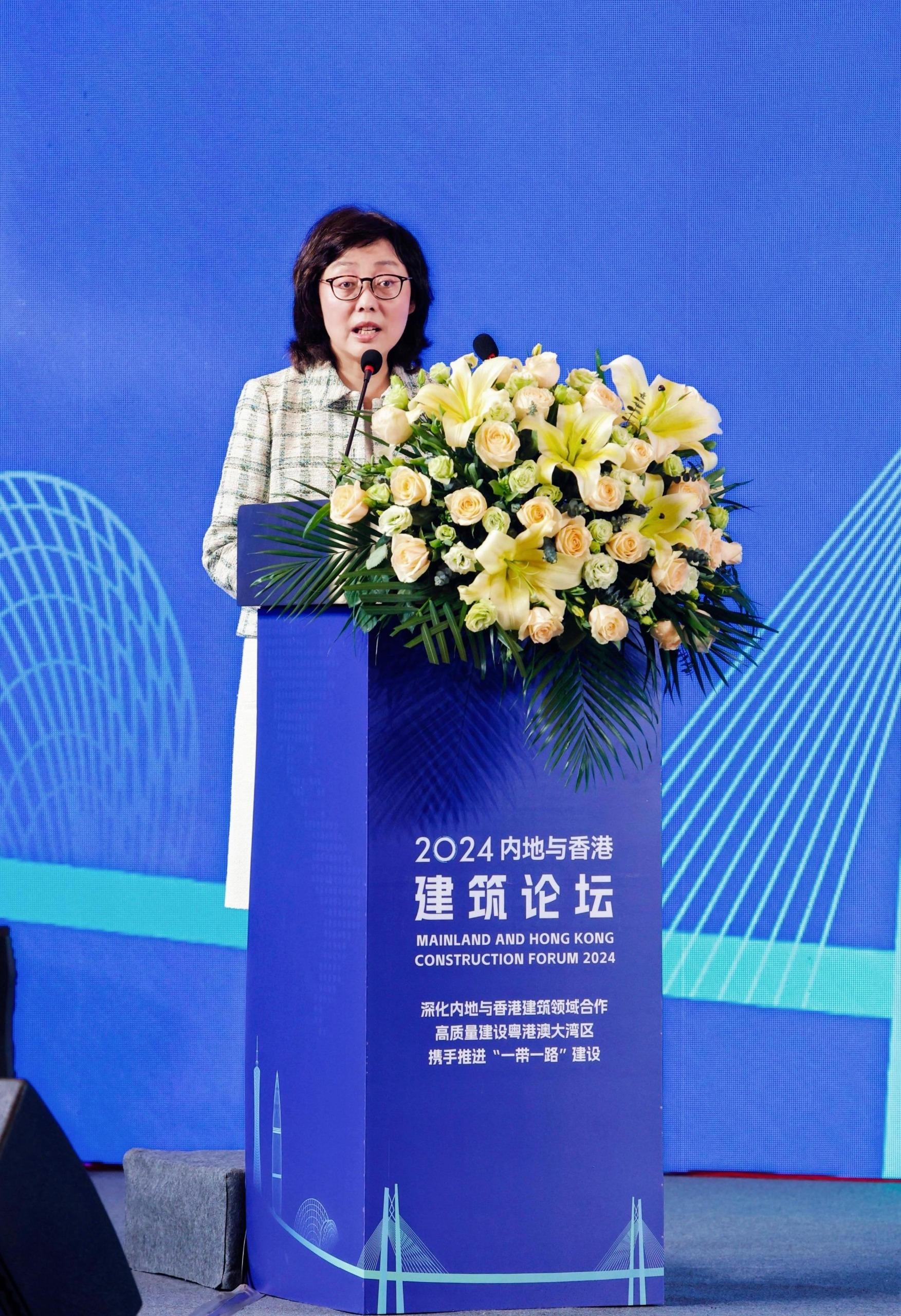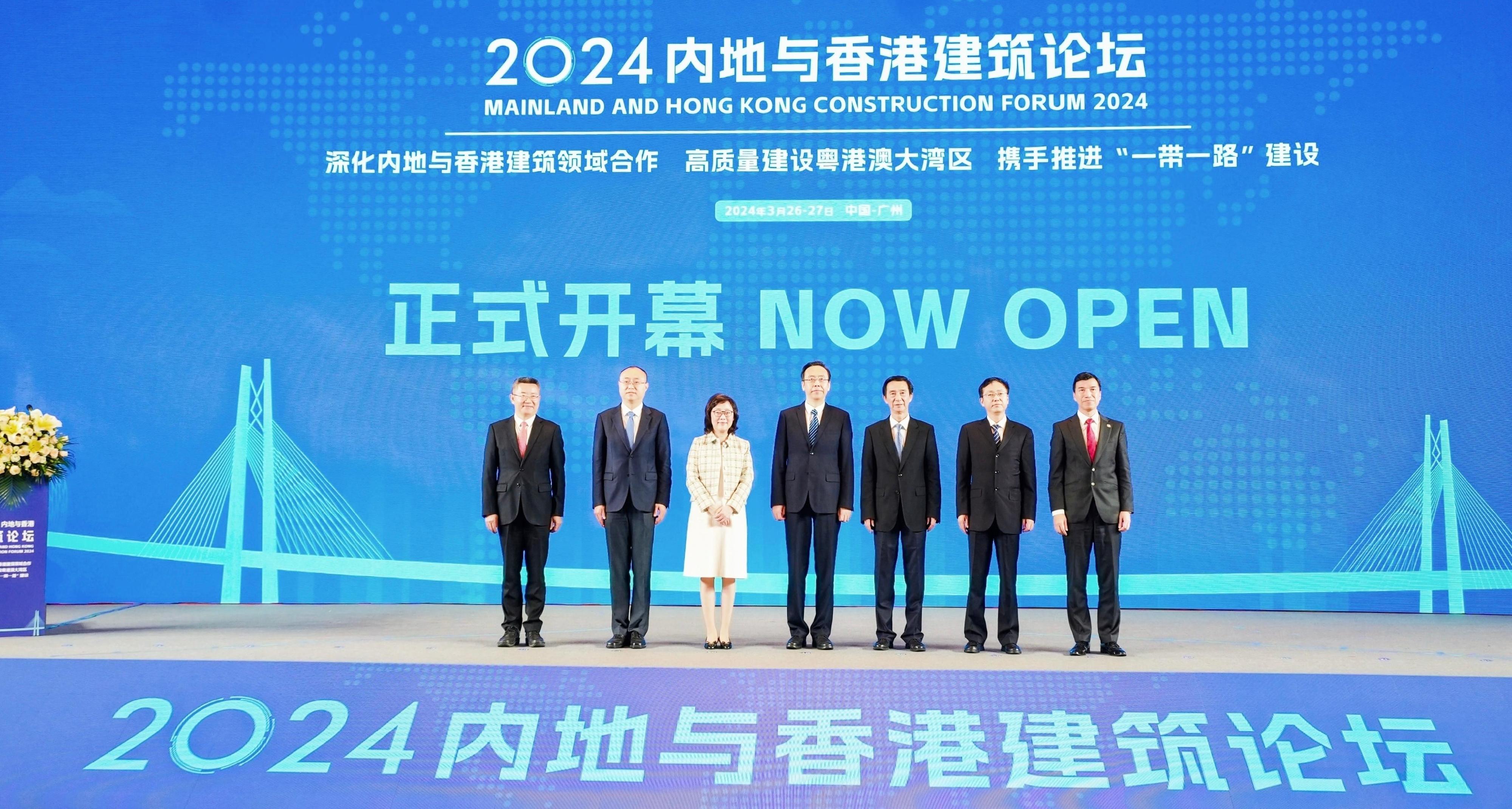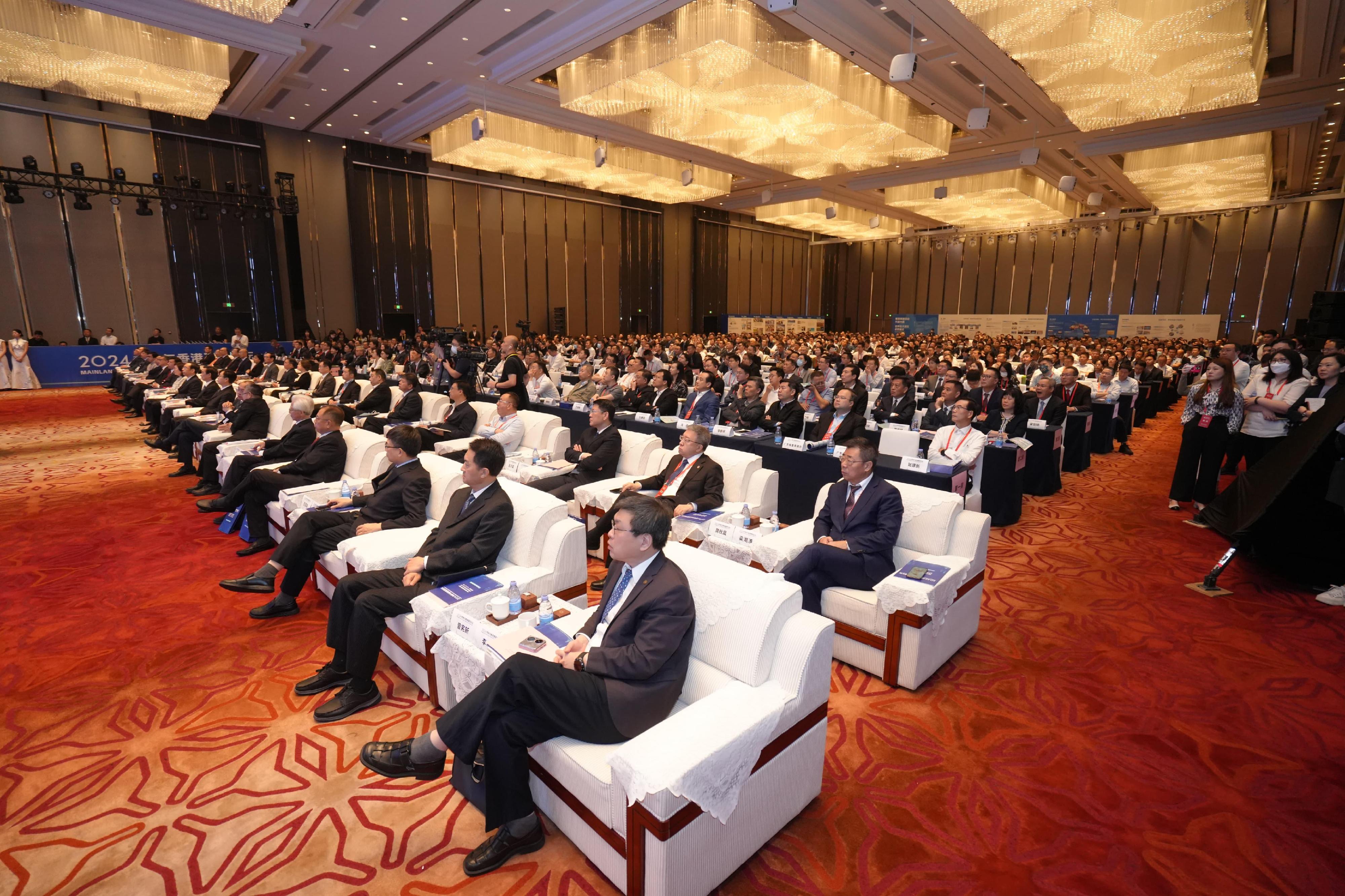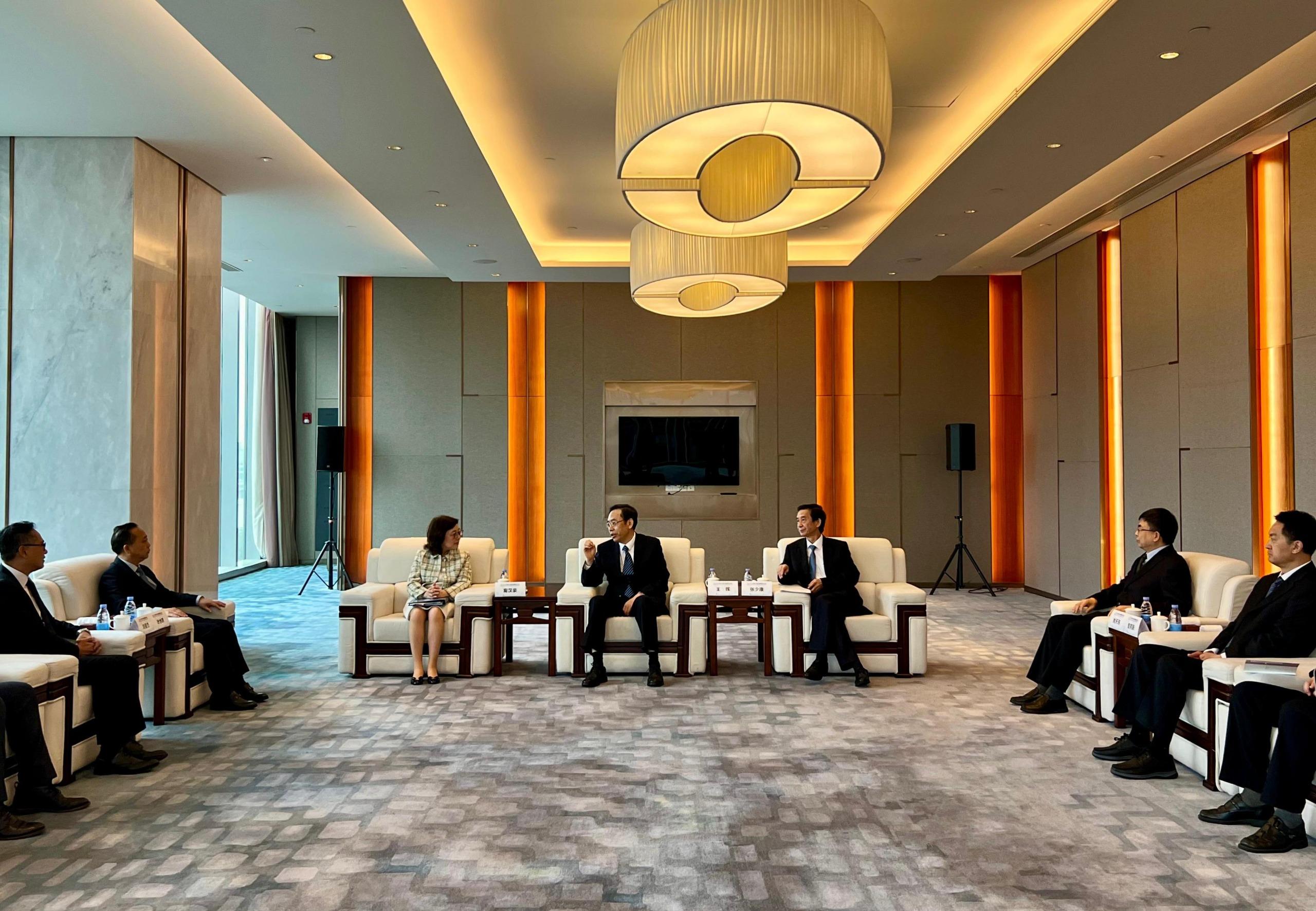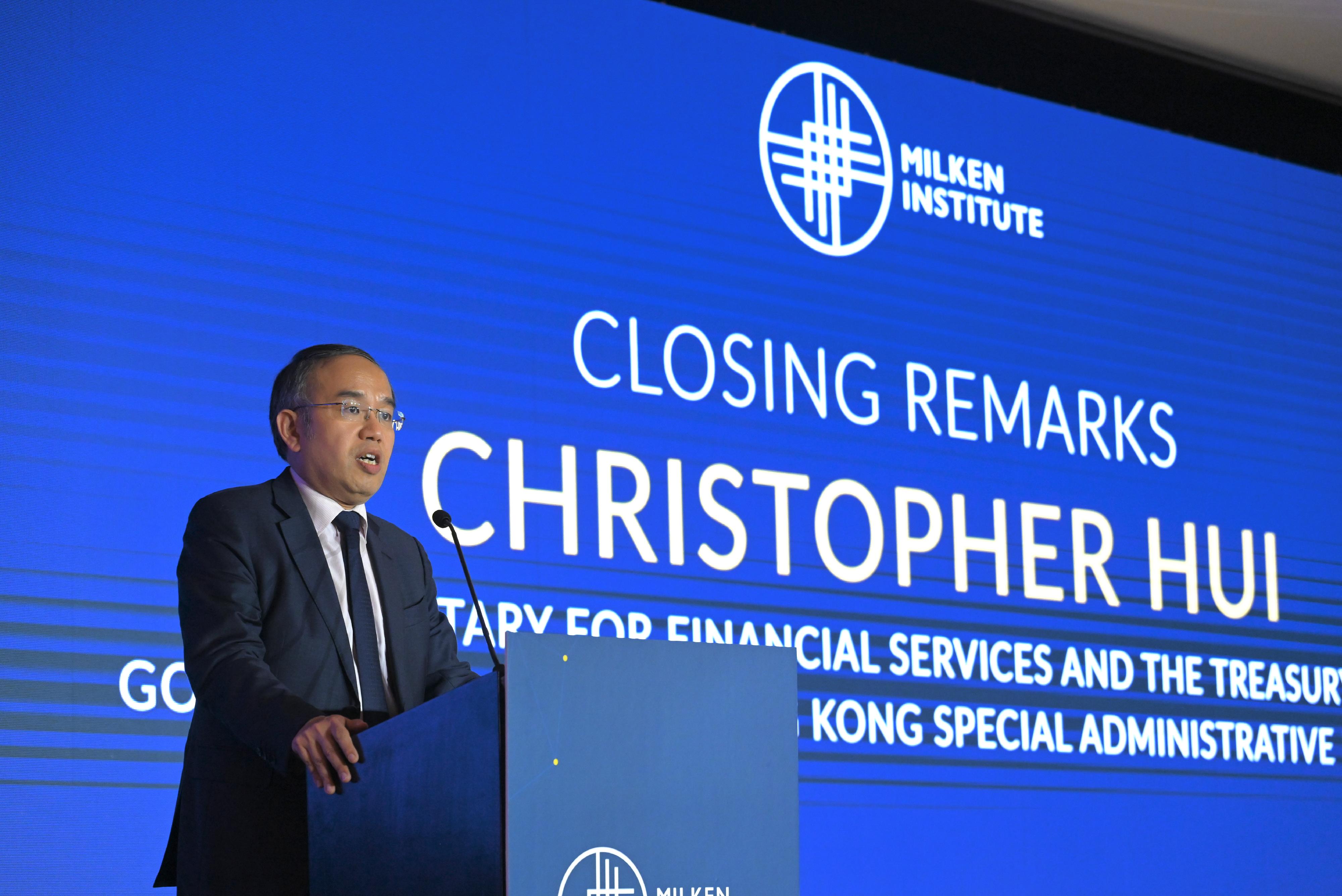Following are the closing remarks by the Secretary for Financial Services and the Treasury, Mr Christopher Hui, at the Milken Institute's Global Investors' Symposium today (March 26).
Distinguished guests, ladies and gentlemen,
It is my great honour to deliver the closing remarks for the Milken Institute's Global Investors' Symposium here in Hong Kong. I would like to express my deep gratitude to the Milken Institute for selecting our city to host this prestigious event. This speaks volumes about Hong Kong's continued status as a leading international financial centre and our unwavering commitment to fostering global collaboration and innovation.
During the symposium today, we have had the privilege of hearing from some of the brightest minds in global finance, investment, technology, and sustainability. You have shared your invaluable insights, cutting-edge expertise, and visionary perspectives for the future – a future that is increasingly interconnected, dynamic, and rife with both formidable challenges and immense opportunities.
As a global financial hub with deep roots in the Asia-Pacific region, Hong Kong is uniquely positioned to serve as a vital bridge, connecting capital, ideas, and innovations around the world. I want to share this unique positioning with you using a "3C" framework showcasing the three crucial connections we can offer. Firstly, it is connecting finance with green and sustainable development, secondly connecting global investors with the Mainland market, and finally connecting wealth with diverse investment opportunities.
Firstly, on the critical topic of green and sustainable finance, the imperative could not be clearer. According to industry research, the Asian region will require a staggering US$66 trillion in climate investment over the next three decades to fund the transition to a low-carbon economy and build resilience against the impacts of climate change. As a global financial centre, Hong Kong is stepping up to the plate, solidifying our position as the top international green and sustainable finance centre. Vibrant market activities vividly illustrate our leading position, as we have a market share of over one-third as a green and sustainable bond arranger in Asia in 2022.
To support this burgeoning sector, the Hong Kong Government has put in place the impactful Green and Sustainable Finance Grant Scheme, which has already provided subsidies to eligible bond issuers and loan borrowers for the issuance of more than 340 green and sustainable debt instruments, totaling over US$100 billion. And just yesterday, we issued a vision statement to assist companies and financial institutions in enhancing their sustainability reporting and data analysis practices, elucidating our vision of promoting green and sustainable finance as a key strategic priority.
These initiatives are all part of our steadfast commitment to channeling capital towards climate-resilient projects, fostering positive change, and facilitating the global green transition. As a leading international financial centre, we have a unique responsibility to be at the forefront of sustainable finance, harnessing our influential position to drive global progress on the critical environmental challenges of our time. In addition, we also seek to explore the synergy between Web3.0 development and green finance, and issued the second batch of tokenised green bonds in early February this year, worth a total of $6 billion and denominated in Hong Kong dollars, Renminbi (RMB), US dollars and Euro. This is the world's first-ever multi-currency tokenised bond issuance, and has attracted overwhelming subscription by global institutional investors.
Secondly, the connectivity between Hong Kong and Mainland China's financial markets continues to deepen and expand in both scope and capacity. Programmes like Bond Connect, the Cross-boundary Wealth Management Connect Scheme, the inclusion of ETFs (exchange-traded funds) in Stock Connect, and the launch of Swap Connect are providing ever-greater access and investment opportunities for both Mainland and international investors.
Looking ahead, we are in active discussions with our counterparts in the Mainland to further broaden and enhance these pioneering connectivity channels. This includes the introduction of block trading, the inclusion of RMB-denominated stocks under the Southbound Trading of Stock Connect, and the expansion of the mutual market access regime to cover Real Estate Investment Trusts (REITs). By bridging the Mainland and global markets, Hong Kong is truly becoming the "super connector" for capital flows, offering unparalleled benefits to investors on both sides.
Thirdly, Hong Kong's role as an international asset and wealth management centre is firmly established and well recognised. With over US$3.9 trillion in assets under management, we are Asia's largest hedge fund hub and the second-largest centre for private equity management after Mainland China. Currently, there are more than 250 open-ended fund companies and 780 limited partnership funds registered in our city, testament to our status as a global hub for the asset and wealth management industry.
To further drive the continued development of this dynamic sector, the Hong Kong Government is taking several strategic actions. We will be extending our grant schemes for open-ended fund companies and REITs for an additional three years, and setting up a dedicated task force to discuss with the industry measures for enhancing the overall asset and wealth management ecosystem.
Attracting global family offices and high-net-worth individuals to establish a presence in Hong Kong is another key priority. In fact, a recent market study estimated there are over 2 700 single-family offices currently in Hong Kong, and it presents a solid ground for us to further grow the sector. To this end, we have implemented a number of measures, including providing tax concessions for qualifying transactions of family-owned investment holding vehicles managed by single-family offices in Hong Kong, and streamlining the suitability assessment when dealing with sophisticated professional investors. We also have launched the new Capital Investment Entrant Scheme, which provides eligible investors who invest HK$27 million or more in qualifying assets and place HK$3 million into a new investment portfolio the opportunity to reside in and pursue development in our city. This initiative will help strengthen our advantages in developing the asset and wealth management industry and related professional service sectors in Hong Kong, while also supporting the growth of our thriving innovation and technology sector. I am also glad to share with you that the response to the scheme is encouraging, with over 1 000 enquiries received.
In addition, we will further enhance the preferential tax regimes for related funds, single family offices, and carried interest, including reviewing the scope of the tax concession regimes, increasing the types of qualifying transactions, and improving flexibility in handling incidental transactions. These measures are all designed to attract more funds and family offices with the potential to establish a robust presence in Hong Kong. Moreover, we will be hosting the second edition of the Wealth for Good in Hong Kong Summit, a flagship event for the Financial Mega Event Week later this week, curating a platform to showcase Hong Kong's unique advantages and engage with the world's leading family offices and asset owners.
Distinguished guests, through the Financial Mega Event Week, we aim to showcase to the international market Hong Kong's pivotal role in the global financial landscape. As an international financial centre with deep, multifaceted connections to the vast and dynamic Mainland China market, we are uniquely positioned to be a hub for green finance, cross-border investment, and asset management excellence.
The Milken Institute's Global Investors' Symposium has provided an invaluable occasion for surfacing the key issues, emerging trends, and exciting opportunities facing regional and global markets. I trust that the robust discussions, insightful presentations, and forward-looking ideas generated here will help guide the way forward as we navigate an increasingly complex and rapidly evolving global market environment.
Ladies and gentlemen, Hong Kong's role as a global financial hub has never been more vital. By leveraging our unique "3Cs" – connecting finance, markets, and wealth – we are poised to play a central role in addressing the world's most pressing challenges and seizing the opportunities of the future. The Milken Institute's Global Investors' Symposium has been an invaluable platform for advancing this vision, and I am confident that our continued partnership and co-operation will yield tremendous benefits for all.
On behalf of the Hong Kong SAR (Special Administrative Region) Government, I thank you all for your active participation and invaluable contributions to the discussions and dialogues in the symposium, one of the key events for our Financial Mega Event Week. I wish you a safe journey home, and look forward to our continued collaboration in the years ahead as we work together to build a more sustainable, prosperous, and interconnected future.
